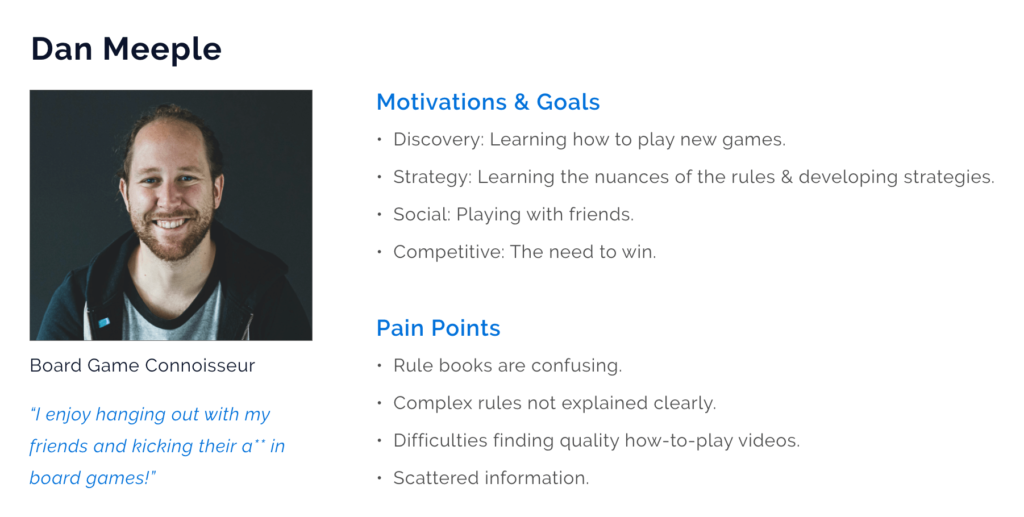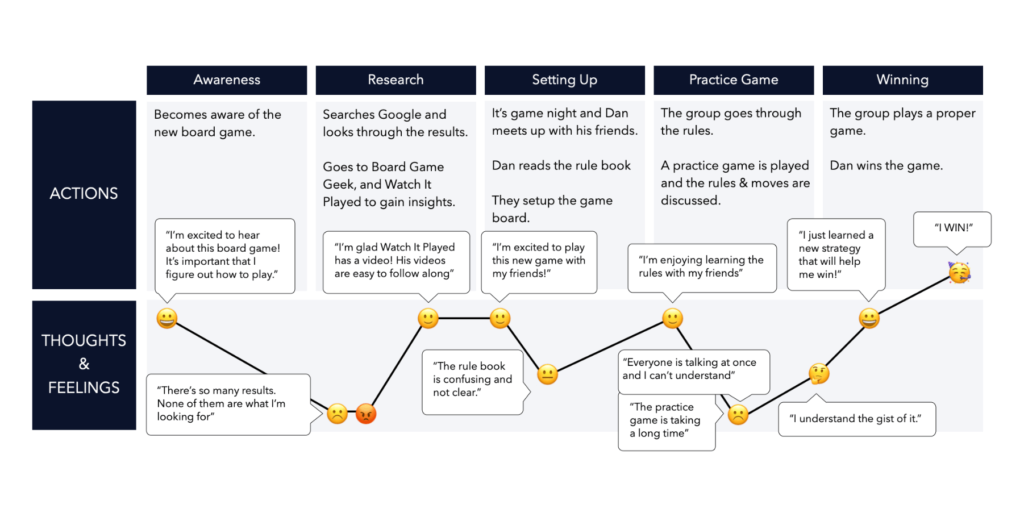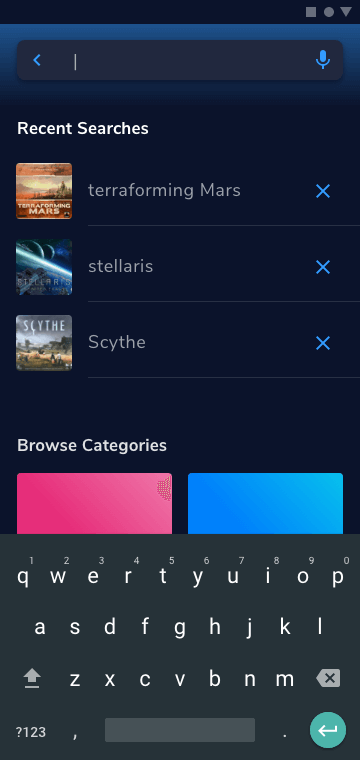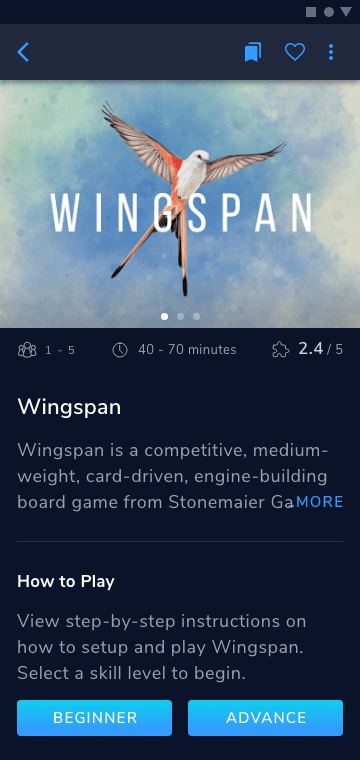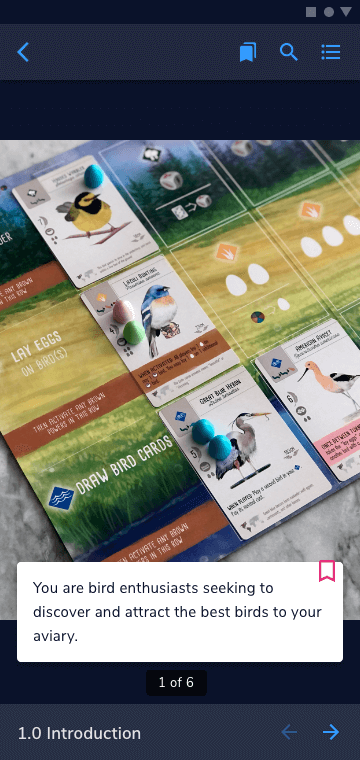Onboarding Companion App for Board Games
An app designed to teach players how to play a new board game and help experienced players improve their strategy.
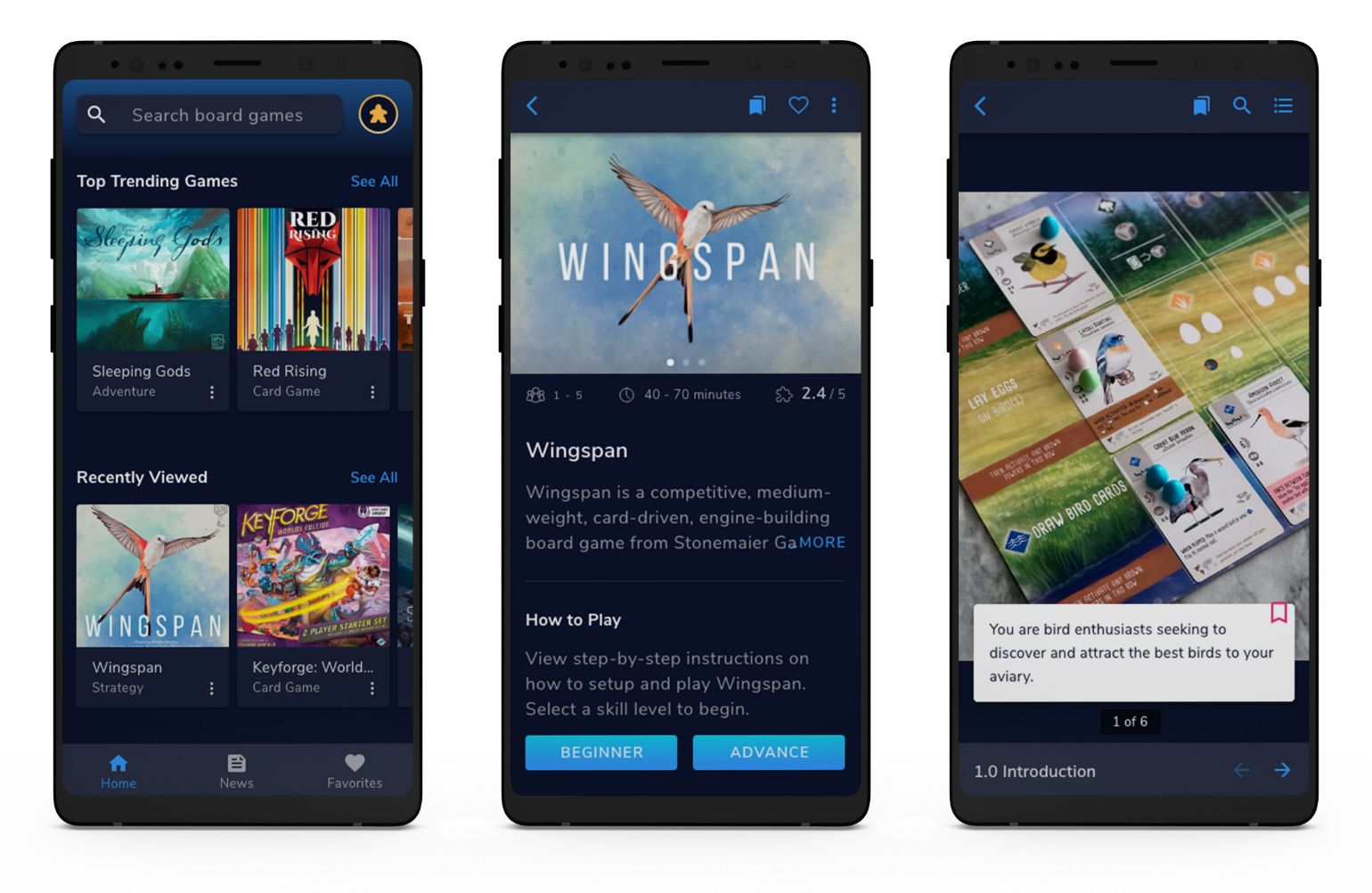
Introduction
Learning how to play a new board game can sometimes be a confusing and frustrating experience depending on the complexity of the rules, the quality of the information, and who you are playing with.
Board Gamers is an app that aims to get new players started quickly and help experienced players learn about the nuances of the game to improve their strategy. It achieves this by effectively teaching players how to set-up and play through step-by-step instructions and providing experienced players with a variety of strategic tips they can use to perfect their game.
My Role
UX/UI, User Researcher, User Testing
Type
Individual Case Study · School Project
Tools Used
Adobe XD, Google Suite
Timeline
5 weeks · Jan 2021 – Feb 2021
Why Board Games?
As a board gamer myself, when playing a new board game, I began to notice that it was taking a long time to set-up and ensure that everyone in the group was on the same page. I started to think about how the experience could be improved and how we could break down the process in ways that people could understand.
Understanding the Problem
The Current Experience
Manuals are wordy and learning is slow
Through user research, I discovered the following challenges that users have when learning how to play a new board game:
- Manuals are lengthy and there is too much reading.
- Complex rules are hard to understand.
- Cognitive overload from too much information.
- Friend’s explanations are unclear.
- Time-consuming to read the rules and play a practice round.
The Problem
How might we help players learn the rules of the game quickly
and accurately?
How might we bring together the spread out pieces of information in one localized area in a simple way?
The Challenge
Teaching the rules effectively in an easy-to-understand manner before users get frustrated and give up.
Solving the Problem
Breaking down the information and bringing it into focus
Create an easy to use mobile companion app for board games that:
- Teaches the basics through succinct step-by-step instructions.
- Brings together board game learning resources together into one place.
- Offers information that caters to different player skills where more experienced players can use to improve their strategy.
- Gets players excited to play the game.
→ Click here to view the Prototype
Scope and Constraints
Short timeline, the need to design quickly
With the short timeline, the following constraints were used to help focus my design:
Experience
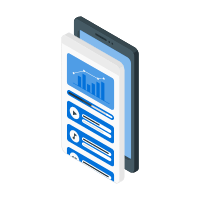
Mobile (Android)
Visual Design

Material Design
MVP Features
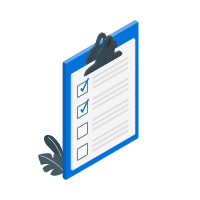
Prioritized List
Retention

Design for Engagement
The Design Process
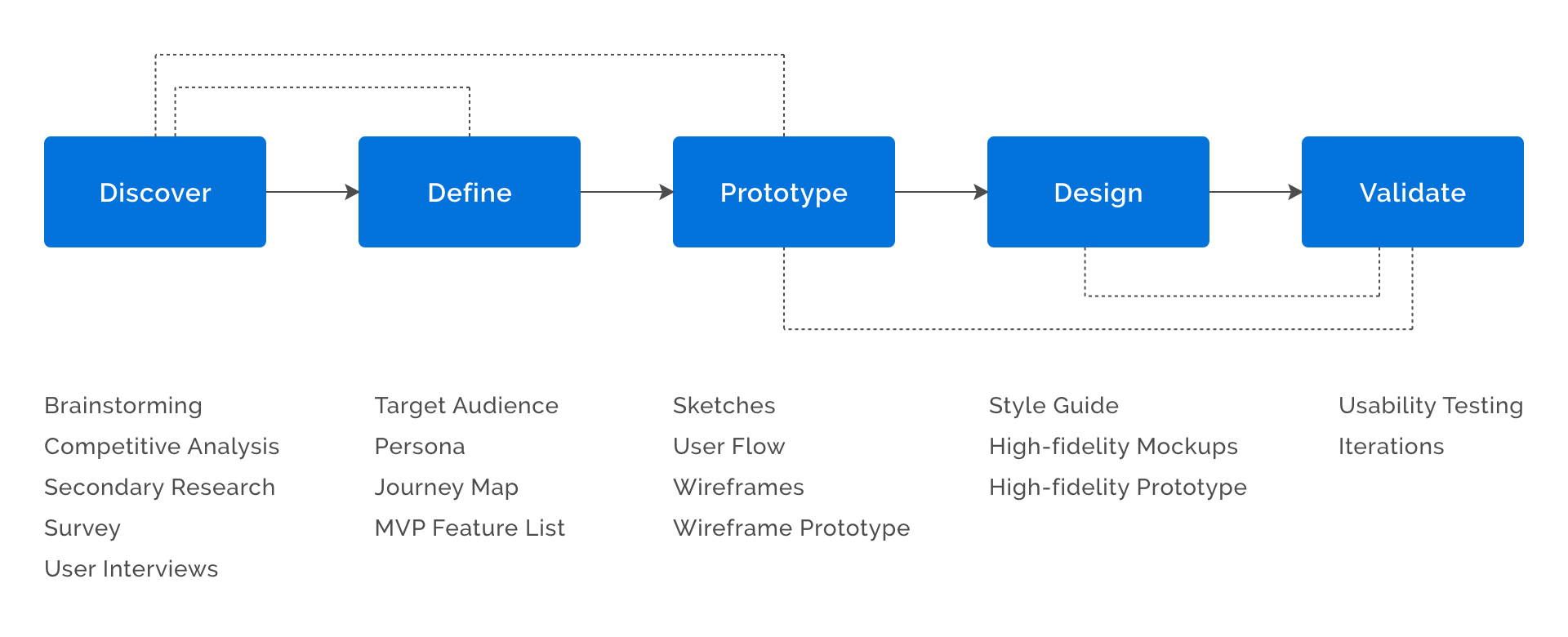
The Starting Point: Brainstorming & Assumptions
Before starting the research phase, casual conversations were had with board gamers to get a better understanding of their experiences and where they go to learn about new board games.
Assumptions were built from these initial conversations and will be validated through user research.
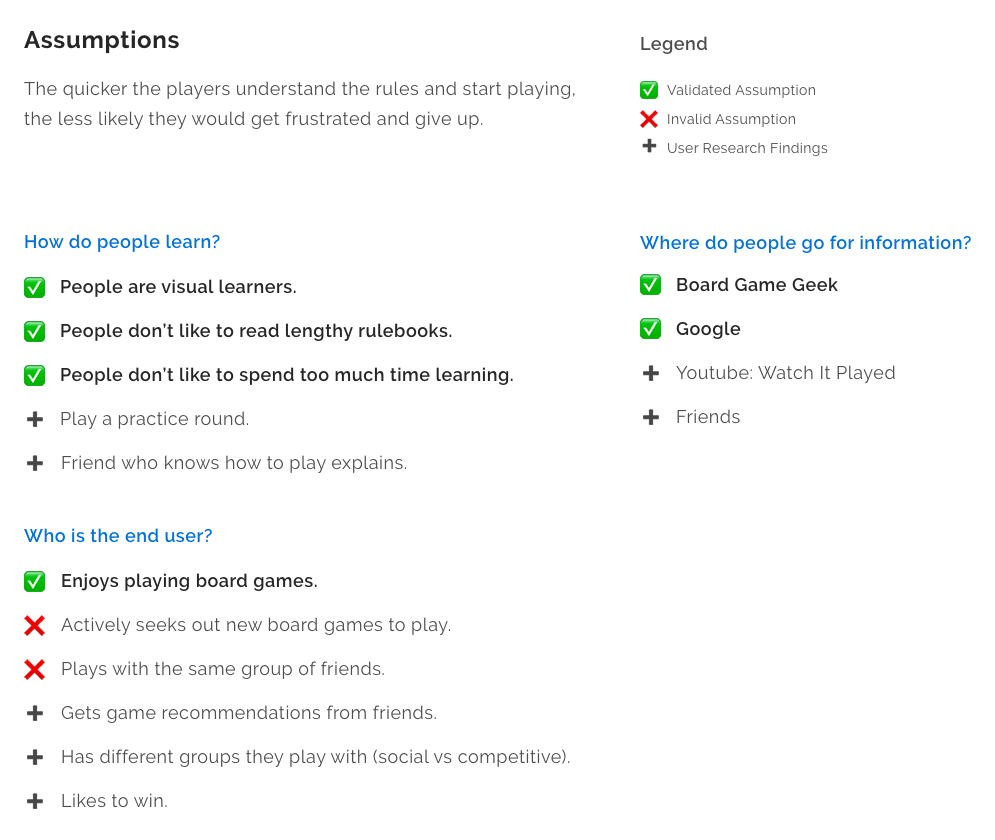
Brainstorming Session with Classmates for Ideas
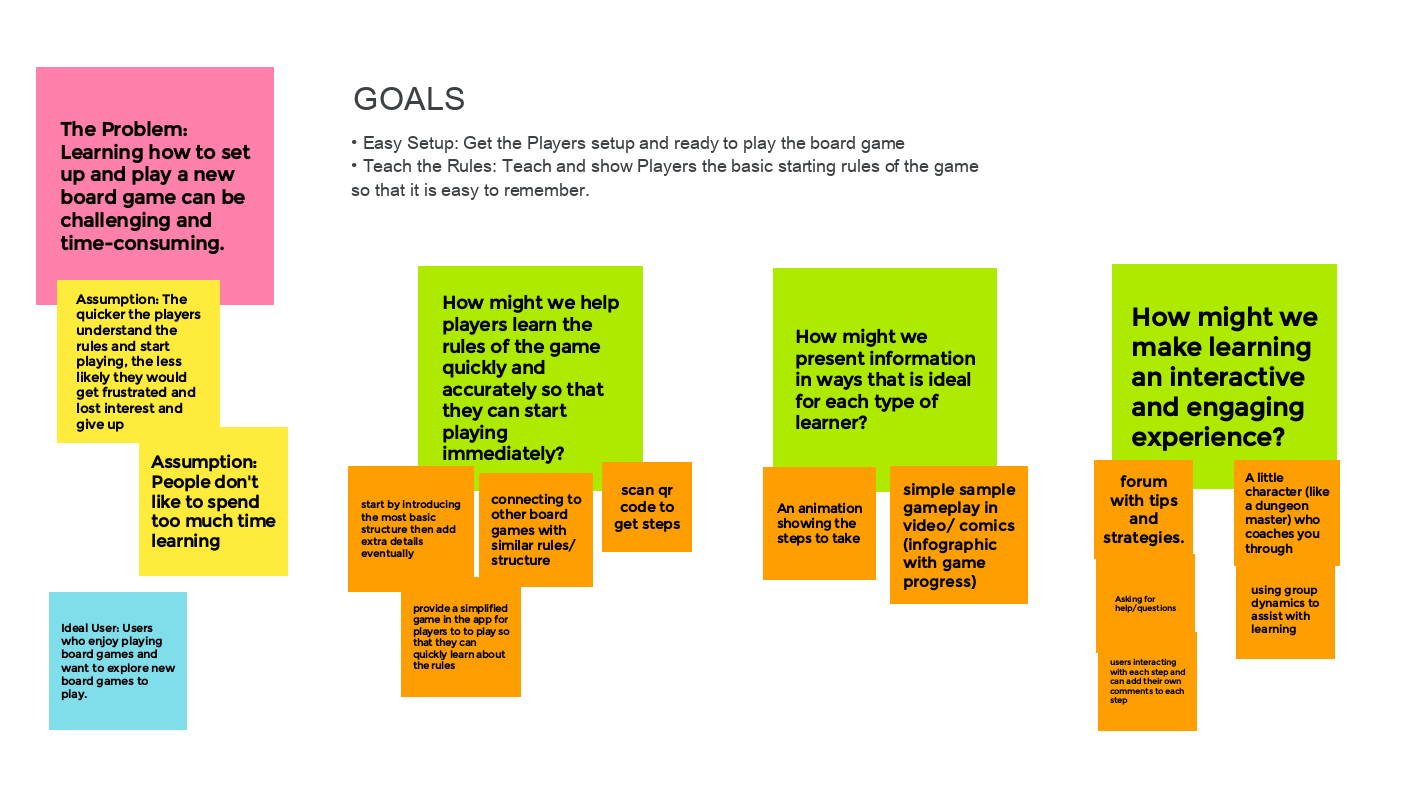
Research: Understanding the Space & Users
Research Goals
Find out how people learn to play a new board game and discover what learning methods work and which don’t.
Learn about people’s experiences and pain points they encounter when playing a new board game.
Gather insights into board gamers’ behaviours.
Competitive Analysis: What resources are available to users?
I did a competitive analysis to help me identify what resources are available to board gamers and what opportunities are available in the market.
Looking at what resources board gamers turn to for information gave me an understanding of how they learn about the games.
Board Game Geek Website
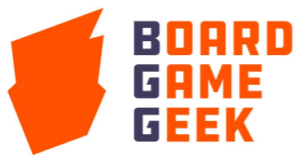
﹢ Large database for board games.
﹢ Active community.
-Inconsistent site navigation.
Watch It Played Youtube
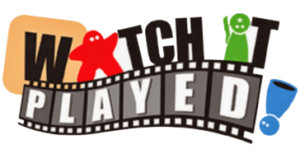
﹢ Step-by-step instructional videos.
﹢ Clear visuals of game pieces.
-Content limitations.
Competitive Analysis Takeaways
- No native mobile apps for general board game references (apps available are specific to the game).
- There is a lot of information scattered across different mediums and places.
Secondary Research: Board Gamer Motivations
I wanted to get a better understanding of board gamer motivations and discovered Quantic Foundry’s Board Game Motivation Model.
Understanding what motivates users to play board games helped me shape what features would fit into the user’s needs.
Secondary Research Takeaways
- Primary motivation for men is the Need to Win.
- For women, it is Social Fun and Accessibility (easy to learn & easy to teach).
- Both men and women want to “kick your ass”.
User Research: Understanding the User’s Motivations & Frustrations
To gain a better understanding of the user’s frustrations, motivations, and experiences, a survey was created to gather behavioural information and user interviews were conducted to gain qualitative insights.
Survey
To begin validating some of my assumptions, I conducted a quick user survey with board gamers.
I learned that having someone explain the rules is the top method to learn how to play.
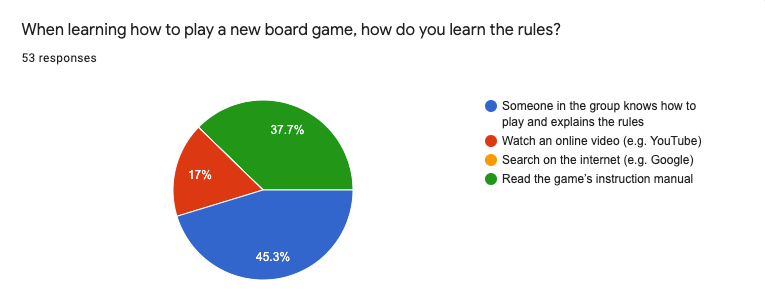
When respondents were asked about their learning experience, the top frustration they encounter is when complicated rules are not explained clearly (34%) followed by having to play practice rounds to fully understand the rules (17%).
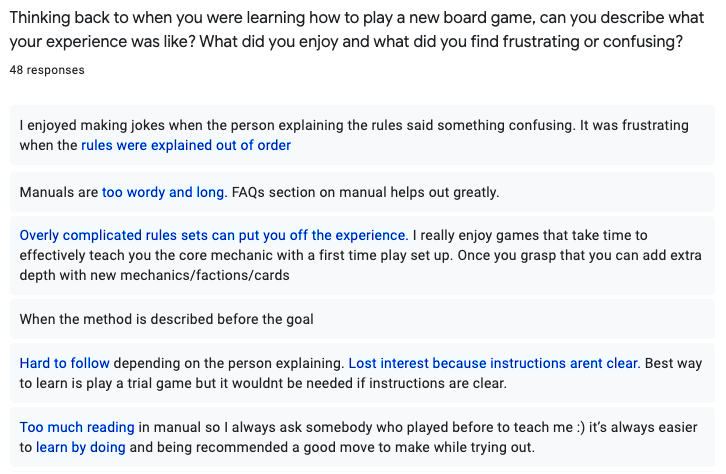
User Interviews
The responses from the survey helped me formulate interview questions.
I conducted interviews with 6 people who are avid board gamers that play 2+ times a month. I learned that the most preferred way of learning is learn-by-doing and that more experienced players seek out more information to improve their strategy to win.
Common Pain Points
- Rulebooks are confusing and there is “too much reading”.
- Too much information when searching online.
- Confusion when someone explains the rules poorly.

Teach me as we go, I want to get the funnest part and rather play and fail.
When you Google, how to play a board game, you get too many video results and there’s differences in length, some ramble, some try to be too kitschy. At the end of the day, I just want a concise, but detailed explanation of the game


I want to think about the strategy. Most don’t break it down into layers where as a beginner you can do this and as an intermediate player you can think about this and as a hardcore gamer, you can think about these specific strategies
Research Insights
People do not enjoy reading
How might we make information easier for users to digest?
People learn-by-doing
How might we make this an interactive experience for users?
Too much information
How might we filter out the low-quality information?
Target Audience: Tech-savvy Millennials
From my research, I determined the target audience for Board Gamers would be:
- Millennials ages 35 – 44 years old with an average household income of >$100, 000.
- They play board games 2 – 3 times a month with their friends.
- They play board games online and also in-person with their friends.
- They enjoy the social aspect of playing board games and like to win.
- They like a broad range of board games from ones that are easy to learn to more complex ones.
- They are tech-savvy.
Persona & User Journey: Empathizing with the User
I built a persona and journey map that best embodies the research. This helped me empathize with the user and gave me a reference point when developing my solution.
Ideate with Goals and User’s Needs in Mind
A priority one feature set was narrowed down from the initial brainstorm and determined based on the synthesized persona and the user’s primary goal of learning how to play a board game.
Design Goals
Teach: Keep It Simple
Effectively show how to set-up and teach players the core mechanics and goals.
Clarity and Hierarchy
Bringing information into focus through clear visual hierarchy.
Layering on Complexity
Prioritizing information that players need to know first and then add depth once the players understand the basics.
Features
User Flow
A basic user task flow was created to help visualize the path the user will take and a detailed user flow was created.
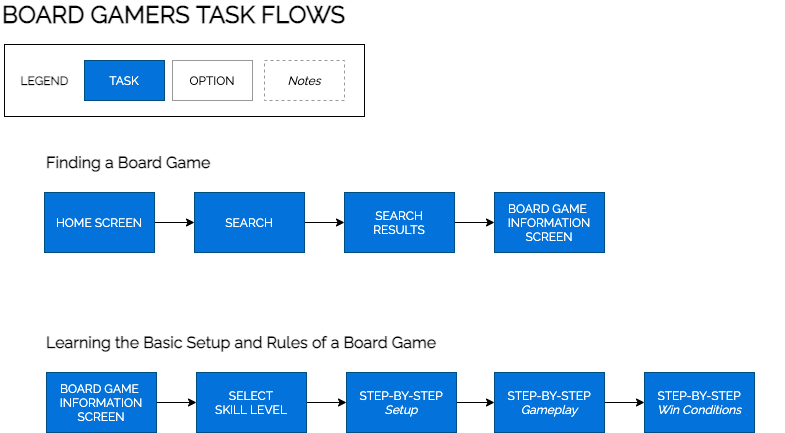
→ Click here to see a detailed User Flow Diagram
Low Fidelity Explorations
Sketches
I began my design with wireframe sketches to ensure hierarchy and started to incorporate Material Design elements to see how they can be used with my features.
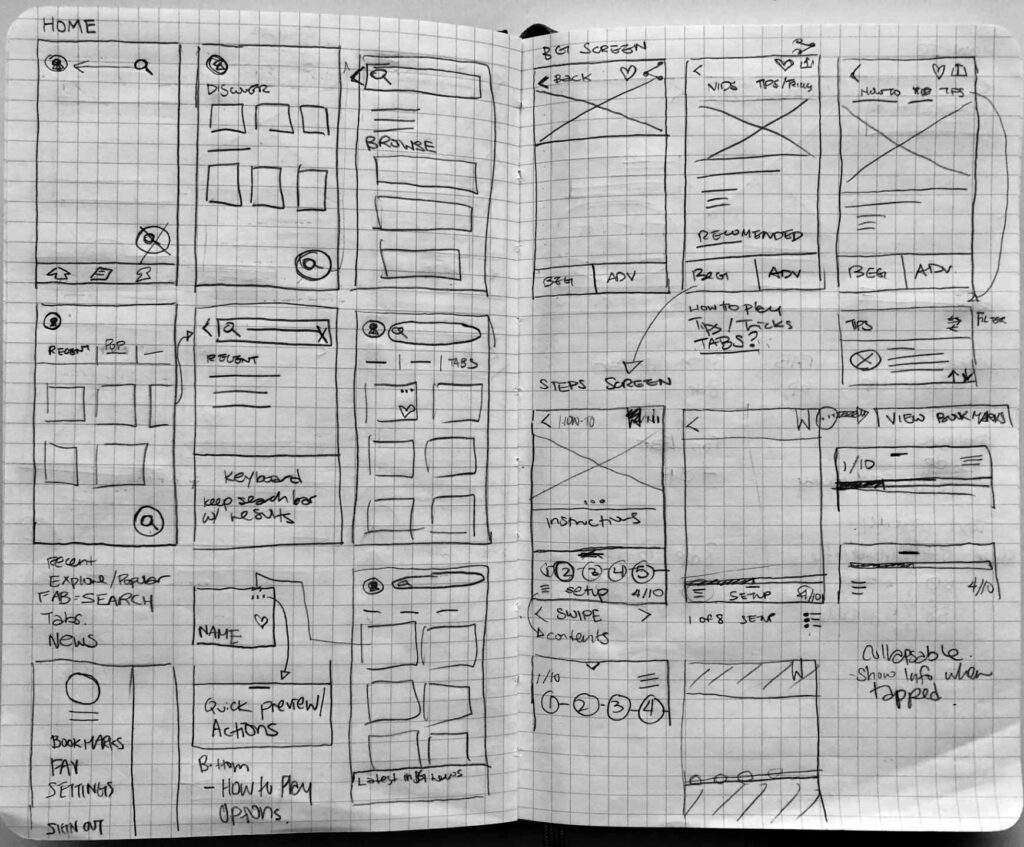
Wireframes
Wireframes were created and a prototype was put together to test for flow and app functionality.

Usability Testing: Fail Fast, Iterate Quick
Usability Testing
Overview
- 7 users
- 6 tasks
- 2 iterations
Tasks
- Search for the board game Wingspan.
- Find the step-by-step instructions.
- How would you navigate to the next step?
- Where would you go to find the table of contents?
- How would you bookmark a step?
- Where would you go to find your bookmarks?
When there was an issue discovered, quick iterations were made and tested with the next participants.
Iteration #1: The FAB was confusing
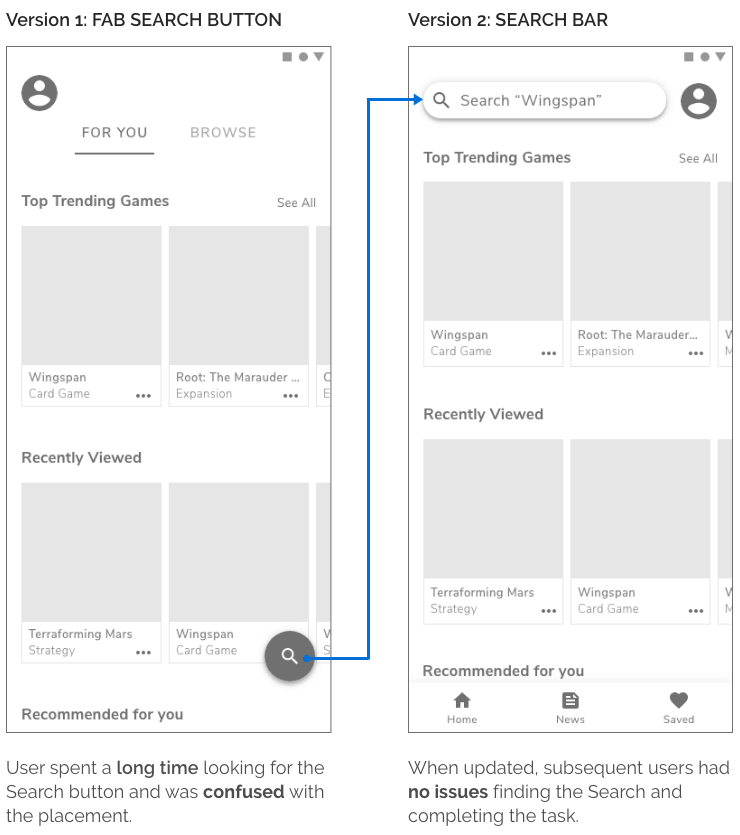
Iteration #2: Users missed the How to Play tabs
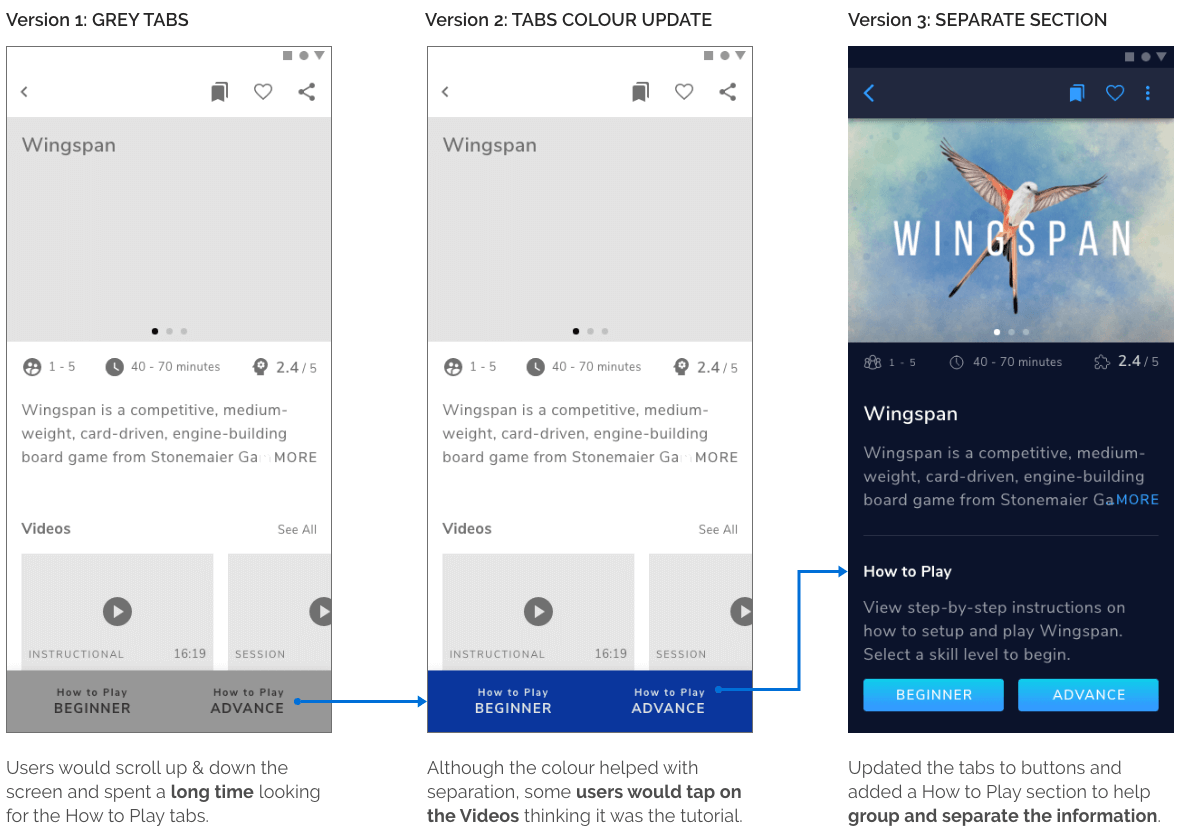
After the updates, subsequent testers had no issues locating the Search and How to Play Buttons.
Visual Design
Informative, Interactive, and Modern
The app’s purpose is to teach and inform and the visual theme would be informative, interactive, and modern. The dark UI with the bright colours adds contrast and can help with making various visual and text elements stand out.
Nunito Sans was chosen for its legibility and versatility.
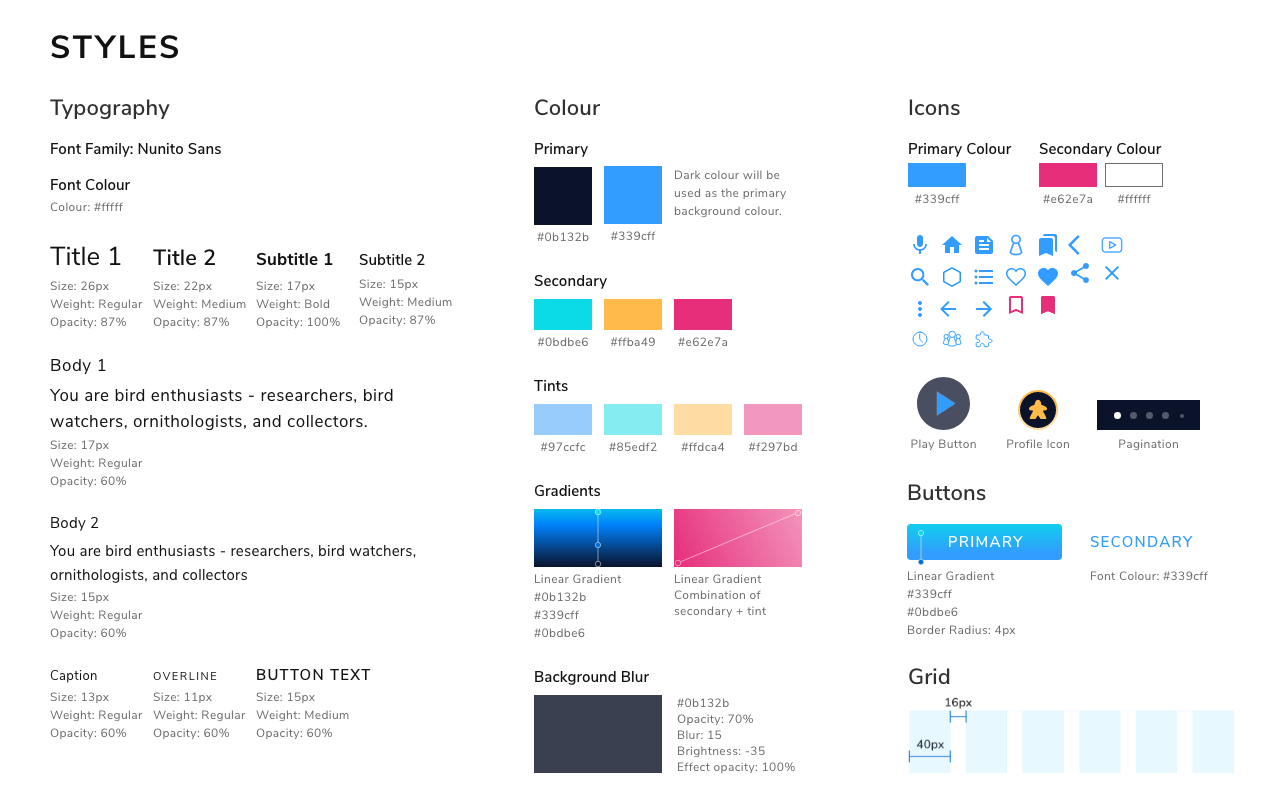
High Fidelity Mockups
Home Screen
Users can search or browse through what is currently trending and recommendations for them based on what the user has viewed and added to their Favourites List.
If the User has searched and viewed a board game, it will also be available on their Home Screen to select under “Recently Viewed”.
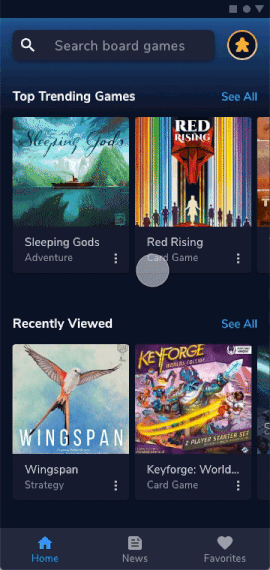
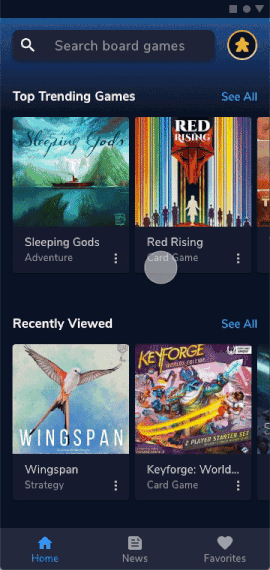
Home Screen: Quick Actions Modal
On a board game, users can access a modal with a list of quick actions that they can select from and quickly jump into watching the videos and viewing how to play instructions.
Search
Users can search board games via keywords or choose to browse through the different categories. When searching, search recommendations will display immediately after the user has entered 3+ characters.
Users can also view their last 3 recent search results and have the option to delete the search if they choose to.

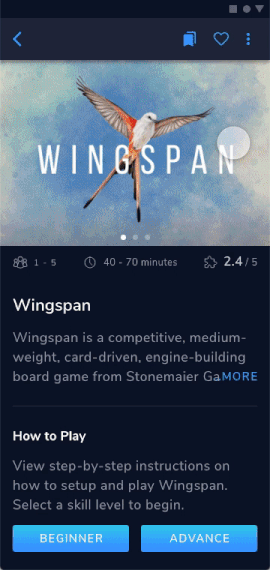
Board Game Information
Users can find information on the board game, how to play, a variety of different videos, tips & strategies and recommendations for similar games.
For how to play instructions, users can select their skill level to start the step-by-step tutorial guiding them on how to set-up and play the game.
Step-by-Step Tutorialization
Each step is accompanied by a short text dialogue and visual which can be static or dynamic gifs.
Users navigate through each step by tapping on the dialogue box, swiping or using the arrows. Users can hide the nav menus for a full-screen experience.
Users can add and view bookmarks. Search within the rules and view a table of contents.
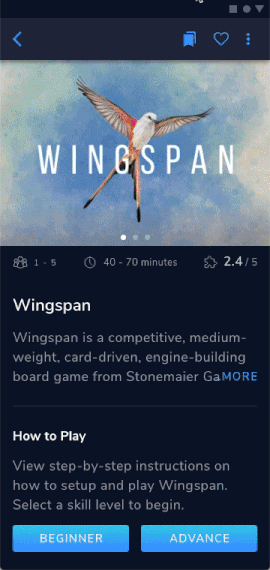
Usability Testing Round 2: Measuring Success
A high-fidelity prototype was created from the mockups to conduct further testing measure:
Task Completion
How quickly can users set-up a physical board game using the app?
User’s Understanding
How accurately did they follow instructions and did they understand what they did?
Overview
- Users are board gamers who have never played Wingspan before.
- 1 User using board game instructions.
- 3 Users using Board Gamers App (1 individual and a group of 2)
Equipment
- Wingspan board game
- Mobile phone
Task
Setup the board game Wingspan
User #1: Baseline
Board Game Instructions

Task Completion: 41 mins
The setup instructions with the game are confusing and not clearly laid out. I’m looking for 8, but there’s no 8 in the picture.
User #2: Individual
Board Gamers App

Task Completion: 17 mins
Pictures were great and helpful!
Users #3 & 4: Group
Board Gamers App

Task Completion: 13 mins
I’m sooooooo excited to start playing!
This is just enough information.
Quick Iteration: Explaining the Discard Pile
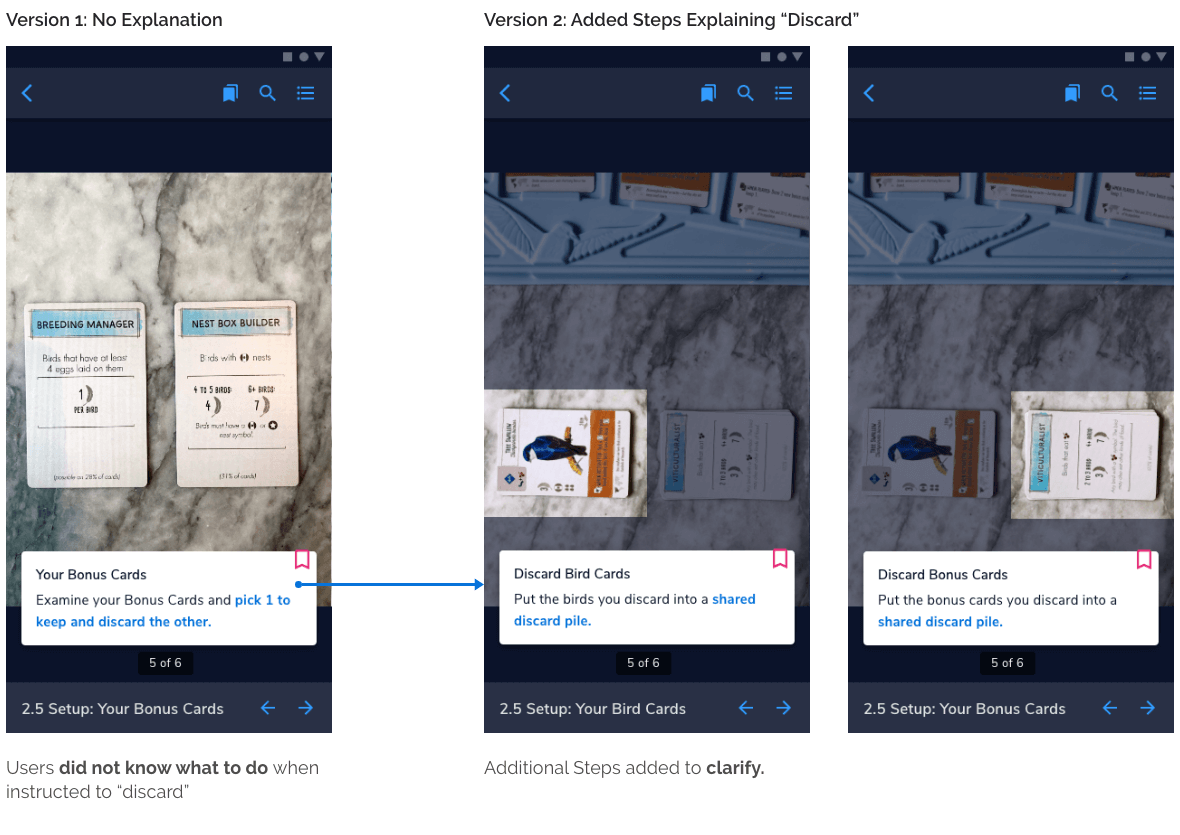
Reflections & Takeaways
The Art of Silence
During interviews, I had to resist my urge to fill in the awkward silences. But with the silence, I found that instead of me filling in the gaps, the interviewee will often fill it with additional stories. This has helped me uncover more about their experiences.
Using Material Design
This was my first time using Material Design and there were some nuances I had to learn on how elevation is utilized.
Usability Testing during the Pandemic
Due to the pandemic, I had some issues with recruiting testers for my second round of usability testing. Testing was done with my inner circle. Additional testing can be conducted once it is safe to get more people together in a space.
Next Steps
There is an opportunity to dive deeper into the research and look into how groups can influence learning.
For future releases, there are opportunities to add social and community features and additional support to help board gamers reach their next level of play.

